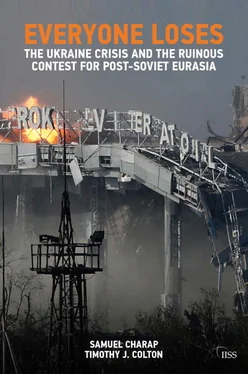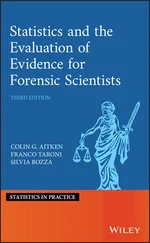Russia’s incursion into Crimea had a raft of other unintended effects, setting off potent forces that among other things constrained its own policy. It emboldened pro-Russian politicians in Crimea and evoked latent separatist sentiment among the majority of the population on the peninsula. It also brought to the fore Russians’ attachment to Crimea; surveys in 2013 had shown that more than half of Russian citizens considered Crimea to be part of Russia, not Ukraine. [35] Polling data in Mezhdunarodnyi diskussionyi klub Valdai, ‘Sovremennaya rossiiskaya identichnost’: izmereniya, vyzovy, otvety’, September 2013, http://vid-1.rian.ru/ig/valdai/Russian_Identity_2013_rus.pdf .
This combination of knock-on effects of the invasion led to an improvised annexation operation. In late February, the Crimean authorities, defying Kyiv, called a referendum on greater autonomy, to be held in May. Within less than a week, the date was moved forward twice and the question on the ballot changed. Voters were now asked whether they preferred to join Russia or remain part of Ukraine with enhanced prerogatives. While Putin had publicly reaffirmed Ukraine’s territorial integrity as late as 4 March, within days the forces unleashed by the invasion left him with a choice of capitulation or annexation. [36] See Putin’s remarks during a press conference that day: ‘Vladimir Putin otvetil na voprosy zhurnalistov o situatsii na Ukraine’, 4 March 2014, http://kremlin.ru/events/president/news/20366 .
In a hastily organised plebiscite conducted on 16 March with Russian special forces on guard near ballot stations, 97% of voters allegedly supported the option to join Russia, a result so preposterously lopsided as to further discredit the referendum, which was held in flagrant violation of the Ukrainian constitution. Moscow then moved quickly to incorporate the peninsula into Russia’s federal system. Obama declared that the referendum would ‘never be recognized by the United States and the international community’, a statement that echoed widespread sentiment in the West. [37] ‘Readout of the President’s Call with President Putin’, 16 March 2014, https://www.whitehouse.gov/the-press-office/2014/03/16/readout-president-s-call-president-putin .
On 18 March, Putin delivered a blistering speech before a gathering of parliamentarians and political luminaries to announce Crimea’s ‘reunification’ with Russia. He argued that the Soviet government’s transfer of the peninsula to Ukrainian jurisdiction in 1954 had been illegal and arbitrary. In 1991, when Crimea became part of independent Ukraine, ‘Russia felt that it was not simply robbed, it was plundered’. Russia, he said, had ‘hung its head and resigned itself to this situation, swallowing its pride. Our country was going through such hard times then that it was incapable of protecting its interests. However, the people could not reconcile themselves to this outrageous historical injustice.’ For years, the Russian government ignored their pleas. But, he said, ‘everything has its limits’. After ‘nationalists, neo-Nazis, Russophobes, and anti-Semites’, with approval from the West, took power during the ‘coup’ in Kyiv, Russia had to act:
In the case of Ukraine, our Western partners crossed the line, conducting themselves crudely, irresponsibly and unprofessionally. After all, they were fully aware that millions of Russians live in Ukraine and Crimea. They must have lost all their political instincts and even common sense not to foresee the consequences of their actions. Russia was pushed to a point beyond which it could no longer retreat. If you compress a spring as tightly as possible, eventually it will snap back hard. You must always remember that.
Putin then launched into a diatribe against Western policies since the end of the Cold War, particularly the approach toward Russia and its neighbourhood:
They have deceived us many times, made decisions behind our backs, placed us before faits accomplis. This happened with NATO’s expansion to the east, as well as with the deployment of military infrastructure near our borders. They kept telling us the same thing: ‘Well, this does not concern you.’ Easy for them to say…. They are constantly trying to force us into a corner because we have independent policies, because we stand up for ourselves, because we call things like we see them and do not engage in hypocrisy. [38] ‘Obrashchenie Prezidenta Rossiiskoi Federatsii’, 18 March 2014, http://kremlin.ru/events/president/news/20603 .
The Russian president had thrown down a gauntlet. Within a week, the ink was dry on the legal formalities of the annexation and all armed forces still loyal to Ukraine had left the peninsula (as many as two-thirds, beginning with the commander of the Ukrainian fleet there, defected to Russia). [39] Valerii Shiryaev, ‘Vosem’ zhenshchin v dekretnom otpuske, moryak-geroi i real’naya agentura rossiiskikh spetssluzhb. Kogo vklyuchili v spisok predatelei Ukrainy?’, Novaya gazeta , 29 March 2016, http://www.novayagazeta.ru/politics/72441.html .
In one fell swoop, Russia had rewritten the rules of the regional contestation, casting doubt on its broader relationship with the West and ties with its neighbours.
Whereas in the past it had allowed for notes of ambiguity and compromise, Russia now presented Western interlocutors with rough-edged demands. In crisis talks on 15 March, on the eve of the Crimea referendum, Foreign Minister Lavrov gave US Secretary of State John Kerry a draft text of a ‘Friends of Ukraine’ international action plan. [40] The Russian Ministry of Foreign Affairs published the proposal online two days later: ‘Zayavlenie MID Rossii o Gruppe podderzhki dlya Ukrainy’, 17 March 2014, http://archive.mid.ru//brp_4.nsf/newsline/49766426492B6E9644257C9E0036B79A . Referred to hereafter as the ‘15 March document’ since that was when it was presented to the US secretary of state.
The document contained five actionable points: the fulfilment of the pledges contained in the 21 February agreement to disband armed groups and de-occupy buildings; a new constitutional order for Ukraine, providing for, inter alia, neutrality, federalism and the direct election of oblast governments with significant new powers (including on economic policy and trade links with neighbouring countries); the elevation of Russian as an official state language along with Ukrainian; a new round of regional and national elections to take place after the constitutional reform; and recognition of the right to self-determination of the people of Crimea ‘in accordance with the freely expressed will of its population as manifest in the 16 March referendum’. There were to be EU, US and Russian guarantees of all the above, which was to be codified in a resolution of the UN Security Council. The core objectives – neutrality, undisturbed economic ties with Russia and ‘federalisation’ of Ukraine to ensure the pro-Russian oblasts have a veto over decision-making in Kyiv – have remained unchanged ever since. The Russians now wanted ironclad guarantees regarding Ukraine’s geopolitical and geo-economic future. Rejecting the West’s geo-ideational emphasis on the unalloyed right to choose, Russia wanted the deal clinched by the great powers and imposed on Ukraine.
Doubling down
In the wake of the Crimea annexation, the West and Russia effectively doubled down on the very policies that had precipitated the crisis in the first place. The annexation had failed to further Moscow’s objectives as set out in Lavrov’s action plan of 15 March 2014. So Russia seized on a wave of anti-Maidan, anti-government protests that were now breaking out across southern and eastern Ukraine. After local activists, many of them voicing separatist slogans, seized administrative buildings in Donetsk, Luhansk and several smaller towns in the two eponymous oblasts, declaring themselves the Donetsk People’s Republic (DNR) and Luhansk People’s Republic (LNR), the Ukrainian government ordered a military assault on them under the banner of an ‘anti-terrorist operation’. Initially, it was haphazard and underpowered, leaving volunteer paramilitary battalions to take the lead. A motley crew of Russian civilian volunteers along with special forces and operatives streamed across the border, adding fuel to the fire. The Kremlin also turned up the economic heat by rescinding not only the gas discount accorded to Yanukovych in December but the earlier price cut traded for the extension of the lease on the Black Sea Fleet base in 2010, and demanding prepayment for the following month’s gas delivery.
Читать дальше











